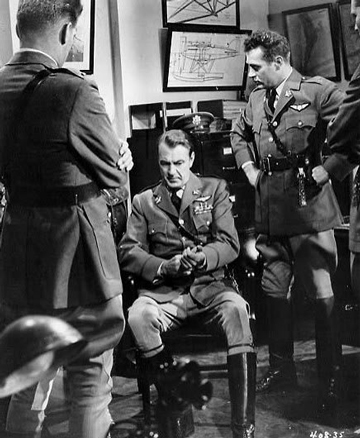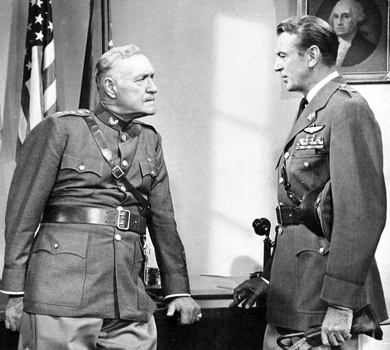
 |
|
|
|
The middle 1950s were busy years for gung-ho aviation movies lauding our flying services. The Pentagon granted millions of dollars of free personnel, materiel and expertise to Hollywood studios with a patriotic story to tell. The movies provided positive public relations for the arms buildup and bolstered the country's resolve to fight communism in the name of national security. Air Force General James Stewart stumped for the airborne nuclear deterrent in Strategic Air Command and Alan Ladd portrayed America's first jet ace as a Korean War hero in The McConnell Story. That same movie begins with a real General haranguing the movie audience, telling us that we don't deserve the precious freedoms that Uncle Sam's flyboys are paying for with their lives each and every goddam day. 
At the other end of Hollywood politics, producer-director Otto Preminger was forcing liberal change in the Production Code. He had just made Carmen Jones, a movie musical in color and CinemaScope with an all-black cast. It seems fitting that when Otto decided to make a movie about the military establishment, he would choose one of the biggest scandals ever to hit the armed services. General William Mitchell had commanded the air wing of the Expeditionary Force that went to France in WW1, and he came back to the states determined to get America's military flying in any way he could. The incredibly stodgy War Department was too busy squabbling over the shrinking military budget to pay attention to technological lessons being learned all over the world -- as far as modernization was concerned, the services were stuck in the 1800s. Since the beginning of his career director Preminger had also produced most of his movies, but for Billy Mitchell he chose to hire out to independent Milton Sperling's United States Pictures. The screenplay is credited to Emmet Lavery and producer Sperling, but according to biographer Foster Hirsch it was substantially rewritten by Ben Hecht to favor the courtroom battle of the third act. We meet Billy Mitchell (Gary Cooper) just after the Armistice, at a demonstration of air power for the assembled heads of the War Department. The object is for Mitchell's biplanes to use aerial bombs to sink a captured German battleship, but Army General James Guthrie (Charles Bickford) alters Mitchell's plan. He orders the planes to attack from twice as high, with smaller bombs. Guthrie means for the test to fail, so that the airplane corps can be de-funded, sidetracked and converted into an entertainment unit. Sick of seeing his men sent up in dangerous airplanes without parachutes, Billy ignores his orders and has sinks the target ship from low altitude with bigger bombs. Furious, the brass demotes him to Colonel and sends him to a desk job far from Washington. Billy uses his vacation time to lobby the War Department about air power, but General Pershing refuses to see him. Congressman Frank R. Reid (Ralph Bellamy) believes in Billy's ideas, however, and becomes a staunch ally. While in D.C. Billy visits his friends Margaret and Lt. Commander Zack Lansdowne (Elizabeth Montgomery & Jack Lord). As the captain of a Navy dirigible, Zach is compelled to obey when the experimental airships are ordered to fly in hazardous conditions. 
Frustrated by the bureaucratic mire that kills good officers and threatens the country's defense, Mitchell feels that he has both a right and a duty to publicize his views outside of military channels. After Zack Lansdowne dies in a dirigible disaster, Billy can no longer remain silent. He gives an open interview in which he criticizes War Department policy as inadequate, outdated and criminally negligent. He's immediately served with Courts-Martial orders. Congressman Reid volunteers to represent Billy at trial, and his defense attorney White (James Daly) thinks he can get him off with just a reprimand. Billy insists on pleading Not Guilty and getting his day in court, as he has purposely provoked the Army to force a reassessment of the nation's defense policy. But the prosecutor Moreland (Fred Clark) has no difficulty restricting the trial to the question of whether or not Col. Mitchell released news statements against Army regulations. And Moreland brings in the Army's toughest legal mind to publicly humiliate Mitchell in the courtroom -- Major Allan Guillon (Rod Steiger). In the postwar 1950s "Billy" Mitchell was considered a great hero. As a young Air Force kid I remember making a model of a B-25 bomber named after him. I was told by my father, a flier who never talked about himself, that Mitchell was the father of the Air Force itself. Apparently Mitchell had been one of his childhood inspirations. In The Court-Martial of Billy Mitchell Otto Preminger unfortunately makes an interesting subject a little less so. Billy Mitchell was a firebrand with a cause and wouldn't take no for an answer; he was too popular for the War Department to quietly suppress. When he wouldn't pipe down Mitchell was demoted, reprimanded and finally brought to trial. He died nine years later in 1936, just when the War Department was just beginning to take air power seriously. Unlike many socially daring movies of the 1950s, Preminger's picture is about a controversy that had long been settled. The ideas of its "rebel" hero had been vindicated a hundred fold. Preminger has fun setting up the Army and Navy brass of 1920 as easy targets. They're complacent dunderheads that think in terms of dreadnaughts and cavalry units. In 1920 there was no real Military Industrial Complex and not even a Pentagon. The army is assembled only when a war seems imminent. We just won the War To End All Wars, after all. In other words, The Court-Martial of Billy Mitchell is really about the need to keep building and modernizing our military and the Air Force in particular. Otto Preminger's movie criticizes an Army mindset of a bygone age but promotes Big Defense, just like any other '50s military propaganda picture. With that in mind, it's interesting that Preminger makes Billy Mitchell such a weak personality. As impersonated by Gary Cooper, he comes on like a soured Capra hero. Billy seems a tired guy more intent on becoming a martyr than getting his way. For just a scene or two Mitchell seems like the forerunner of today's Wikileakers, breaking ranks to give the press his scandalous opinions. The attack is so unprecedented that one of the reporters asks the general to initial his note pad. But rather than continue his verbal attack during the trial with whatever journalist will listen, Mitchell goes into martyr mode. Only through clever legal maneuvering is the defense allowed to discuss the substance of Mitchell's complaints, which is the point when the screenplay turns to Jell-O. The stern head of the trial is none other than Billy's nemesis General Guthrie, and even President Coolidge (Ian Wolfe) wants the Mitchell Affair swept under the rug. Yet behind closed doors the judges, led by an uncharacteristically idealistic Douglas MacArthur (Dayton Lummis), vote to allow Mitchell to plead his case in open court. So what is really put on trial is the peacetime military policy that sends fliers and lighter-than-air aviators up in antiquated or experimental craft solely to promote recruitment and be a PR front for the services. The big dirigibles are lost because they can't take major storms, and flying units are risked in gaudy air races even though their planes are poorly maintained through underfunding. Aviators are treated like daredevils that should expect to die in their line of work. 1 |
|||||||||||||||||||
Review Staff | About DVD Talk | Newsletter Subscribe | Join DVD Talk Forum
Copyright © MH Sub I, LLC dba Internet Brands. | Privacy Policy
Subscribe to DVDTalk's Newsletters
|